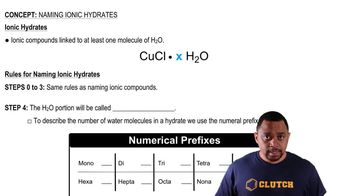Calculate the vapor pressure at 25 °C of an aqueous solution that is 5.50% NaCl by mass. (Assume complete dissociation of the solute.)

Potassium perchlorate (KClO4) has a lattice energy of -599 kJ/mol and a heat of hydration of -548 kJ/mol. Find the heat of solution for potassium perchlorate and determine the temperature change that occurs when 10.0 g of potassium perchlorate is dissolved with enough water to make 100.0 mL of solution. (Assume a heat capacity of 4.05 J/g°C for the solution and a density of 1.05 g/mL.)
 Verified step by step guidance
Verified step by step guidanceKey Concepts
Lattice Energy

Heat of Hydration

Heat of Solution

An aqueous CaCl2 solution has a vapor pressure of 81.6 mmHg at 50 °C. The vapor pressure of pure water at this temperature is 92.6 mmHg. What is the concentration of CaCl2 in mass percent? (Assume complete dissociation of the solute.)
The solubility of carbon tetrachloride (CCl4) in water at 25 °C is 1.2 g/L. The solubility of chloroform (CHCl3) at the same temperature is 10.1 g/L. Why is chloroform almost ten times more soluble in water than carbon tetrachloride?
Sodium hydroxide (NaOH) has a lattice energy of -887 kJ/mol and a heat of hydration of -932 kJ/mol. How much solution could be heated to boiling by the heat evolved by the dissolution of 25.0 g of NaOH? (For the solution, assume a heat capacity of 4.0 J/g·°C, an initial temperature of 25.0 °C, a boiling point of 100.0 °C, and a density of 1.05 g/mL.)
A saturated solution forms when 0.0537 L of argon, at a pressure of 1.0 atm and temperature of 25 °C, is dissolved in 1.0 L of water. Calculate the Henry's law constant for argon.
A gas has a Henry's law constant of 0.112 M>atm. What total volume of solution is needed to completely dissolve 1.65 L of the gas at a pressure of 725 torr and a temperature of 25 °C?
